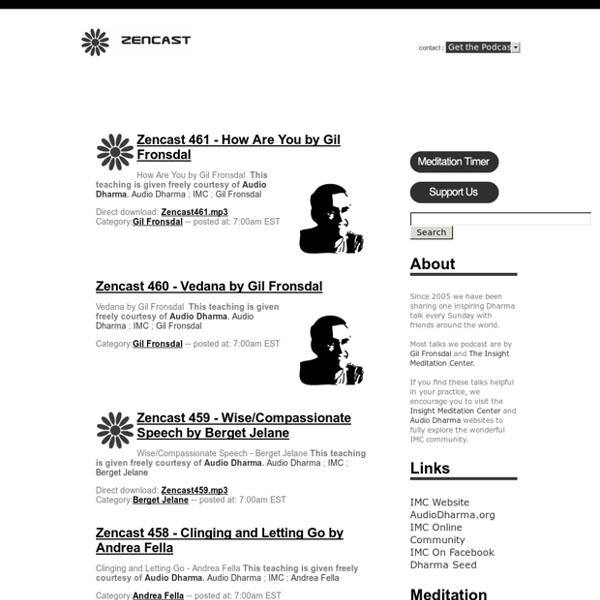



Collected Quotes from Albert Einstein [Note: This list of Einstein quotes was being forwarded around the Internet in e-mail, so I decided to put it on my web page. I'm afraid I can't vouch for its authenticity, tell you where it came from, who compiled the list, who Kevin Harris is, or anything like that. Still, the quotes are interesting and enlightening.] "Any intelligent fool can make things bigger, more complex, and more violent. It takes a touch of genius -- and a lot of courage -- to move in the opposite direction." Copyright: Kevin Harris 1995 (may be freely distributed with this acknowledgement)
Yasodhara Ashram yoga retreat and study centre Sticks and Stones Will Free Our Bones {3} 1500 91 58 45 432 558 1225 529 Buddhist Studies WWW VL Est.: 5 Sep 1994. Last updated: 18 Aug 2016. Edited by: Dr T. Matthew Ciolek (The Australian National University, Canberra, AU), Prof. Joe Bransford Wilson (U. of North Carolina at Wilmington, US) and Privat-Dozent Jerome Ducor (Ethnographic Museum, Geneva, CH) in association with Adrian Hale, Barry Kapke, Murray Kessell, and Peter Schlenker (in US, UK, DE and AU). This site keeps track of leading information facilities in the fields of Buddhism and Buddhist studies. Seven quotes for a Thursday afternoon - Part five "Always be a first rate version of yourself instead of a second rate version of somebody else" Judy Garland "I dress for the image. not for fashion, not for men". Marlene Dietrich "I've never yet met a man who could look after me. Joan Collins (b. 1933) "I'd marry again if I found a man who had fifteen million dollars, would sign over half to me and guarantee that he'd be dead within a year". Bette Davis "All marriages are happy. Shelley Winters "As long as you know that men are like children you know everything!" Gabrielle "Coco" Chanel "I want a man who's kind and understanding. Is that too much to ask of a millionaire?" Zsa Zsa Gabor Seven quotes for a Thursday afternoon is an ongoing weekly series
How Yoga Might Relieve Stress-Linked Ailments: Scientific American Podcast Yoga and relaxation practices have been around for thousands of years. And modern research suggests that yoga could have a very real impact on many stress-related illnesses, including anxiety, depression and heart disease. And here's another reason to be down with downward-facing dog. Stress can make symptoms of chronic pain and depression worse. But yoga might be able to help, in part by stimulating the cranial nerve and an important neurotransmitter called GABA. The new theory is in the journal Medical Hypotheses. Previous research had found that people who did yoga for 12 weeks had lower anxiety and reduced chronic pain than those who went for walks or had standard medical care alone. The researchers are now testing just how well yoga, combined with conventional treatments, can actually improve symptoms of real medical and psychological conditions, including epilepsy, depression and posttraumatic stress disorder. —Katherine Harmon [The above text is a transcript of this podcast.]
What Does Love Mean to a Four-Year-Old? | John Mark Ministries A group of professional people posed this question to a group of 4 to 8 year-olds, “What does love mean?” The answers they got were broader and deeper than anyone could have imagined. See what you think: “When my grandmother got arthritis, she couldn’t bend over and paint her toenails anymore. “When someone loves you, the way they say your name is different. “Love is when a girl puts on perfume and a boy puts on shaving cologne and they go out and smell each other.” “Love is when you go out to eat and give somebody most of your French fries without making them give you any of theirs.” “Love is what makes you smile when you’re tired.” “Love is when my mommy makes coffee for my daddy and she takes a sip before giving it to him, to make sure the taste is OK.” “Love is when you kiss all the time. “Love is what’s in the room with you at Christmas if you stop opening presents and listen.” “Love is when you tell a guy you like his shirt, then he wears it everyday.” Karen – age 7 Like Loading...
100 Inspiring Quotes & Demanding Joy - StumbleUpon So many people have said so many things so much better than I will ever be able to. Here are 100 of them. I hope you find at least a few that speak to you. If you want to be happy, be. – Leo Tolstoy The best way to cheer yourself up is to try to cheer somebody else up. – Mark Twain Happiness is excitement that has found a settling down place. But there is always a little corner that keeps flapping around. – E.L. Konigsburg Man is fond of counting his troubles, but he does not count his joys. Several of these came from Louise Hay, who is pretty terrific. Tags: lists , quotes